Sestrichi will have Corporate Communion on Sunday, October 16, at the 9:00 a.m. Divine Liturgy, with a meeting to follow in the church hall.
Music of Survival
The New England Regional Council of the Ukrainian National Women’s League of America will be presenting the film, “Music of Survival” on Sunday, October 16th at Noon in the Church Hall. Admission for youths is free; $10.00 for adults which includes a small, tasty lunch. The film is in Ukrainian but the presentation is easily understood.
This film documents the famous Bandurist Chorus.
Knights of Columbus called to serve parish
John Burger, a member of our parish with his wife Angeles, is also a member of the parish Knights of Columbus Council. He submitted this presentation for our consideration:
I was invited to represent St. Michael’s and the Knights of Columbus at the Post-Sobor meeting regarding the Vibrant Parish, at St. Basil’s Seminary in Stamford, Oct. 8, 2016. Unfortunately, because of a family commitment, I could stay only for an hour at the beginning of the daylong program, which gathered pastors and parishioners from various parts of the Eparchy of Stamford. I was not able to deliver my presentation, so here it is, for your information:
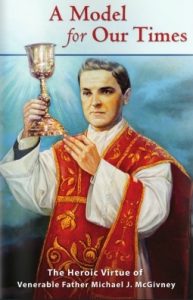 I’d like to briefly introduce you to an initiative that we believe is making St. Michael’s more of a vibrant parish, and that is the new Knights of Columbus council there.
I’d like to briefly introduce you to an initiative that we believe is making St. Michael’s more of a vibrant parish, and that is the new Knights of Columbus council there.
The Knights of Columbus is an international fraternity of Catholic men, committed to serving the Church on the local level and growing in holiness and becoming better Catholic men, husbands and fathers. Founded in New Haven in 1882, the Knights are now approaching 2 million members and have in recent years become active in several countries, including Ukraine.
His Beatitude Sviatoslav has said of this new development, of Knights councils becoming active in Ukraine: “The cherished and practiced ideals of the Knights of Columbus resonate deeply in the soul of a Church and a people experiencing a vivid resurrection in its spiritual and moral life.”
It wasn’t long after the establishment of the first new councils of Knights in Ukraine that they experienced a “baptism by fire,” so to speak: Members of a council that met just five blocks away from Maidan during the protests of 2013 set to work tending those wounded in clashes, providing food and warm clothes, interceding for those who were arrested, and assisting families of people who died. Knights also set up a prayer tent at Maidan to offer spiritual support.
In our own country, in recent years, the Knights have developed new councils in Eastern Catholic parishes, particularly Ukrainian parishes. In 2015, at the instigation of our pastor, Father Iura Godenciuc, St. Michael’s became the first Ukrainian parish in the state of Connecticut to initiate a K of C council. It didn’t take us long to decide what to call our group: Metropolitan Andrey Sheptytsky Council.
Since our founding we have quickly grown into a band of brothers that truly has a family spirit. Meeting together on a Monday night once a month and working shoulder to shoulder on various projects for the parish, we have gotten to know one another in ways that we might never have, merely by seeing each other at Liturgy or chatting over coffee on a Sunday morning. We have been able to offer the gifts and talents that we all have as individuals to respond to various needs in the parish and community.
The first opportunity came last May, when we sponsored the Mother’s Day brunch. This summer, we ran the parish picnic, in conjunction with Ukrainian Independence Day, and next month, we will be assisting at the parish’s St. Michael’s Day Dinner. We are also helping a Ukrainian soldier who was wounded in the conflict in the East of Ukraine and is staying in New Haven for medical treatment.
The possibilities for service are endless, and there is a slate of activities in the coming year. Let me simply offer a few ideas on how the K of C can help fulfill Patriarch Sviatoslav’s vision for a vibrant parish, as outlined in his 2011 pastoral letter “The Vibrant Parish – a place to encounter the living Christ.”
21st Sunday after Pentecost
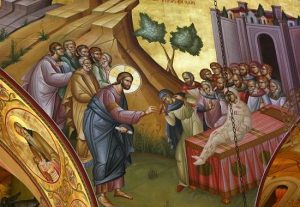 Meditation by the Very Rev. Dr. David M. Petras
Meditation by the Very Rev. Dr. David M. PetrasGalatians 2:16-20; Luke 7:11-16
Our Lord is the Life-giver. The gospels record Jesus’ presence at baptisms and weddings, but never at a funeral, for death cannot remain in the presence of the Giver of Life. Today Jesus comes upon a funeral in the village of Nain, it seems almost accidently and by chance, though nothing ever happens totally by chance. Jesus stops the funeral and raises up the young man, the only son of a grieving widow. The Gospel continues the theme of last Sunday, “Be merciful, as your heavenly Father is merciful, for today Jesus raises the young man, “When the Lord saw (the widow), he was moved with pity for her and said to her, ‘Do not weep.’ He stepped forward and touched the coffin; at this the bearers halted, and he said, ‘Young man, I tell you, arise!’ (Luke 7:13-14)” Here Jesus has compassion on the love of a mother for her child. Today is a prayer for a mother’s love, especially for mothers pregnant with unborn children, that they may bring them to life. Today shows us also the God’s giving of life is not only for the future world but begins here and now. As we receive Communion, the priest says, “The servant of God receives the precious Body and Blood of our Lord Jesus Christ for the remission of sins and life everlasting.” We are in the presence of the Lord, therefore in the presence of life. Jesus teaches, “I came so that they might have life and have it more abundantly. (John 10:10)
Be still Matthew!
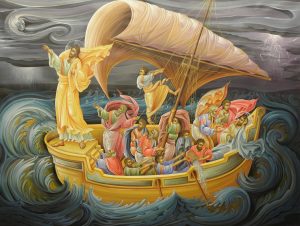 A prayer for those in the path of
A prayer for those in the path of
Hurricane Matthew
O Lord Jesus Christ, who stopped the raging sea by the firm word of Thy command, saying, “Peace, be still!”, so also visit us with Thy might and mercy, further sending this hurricane to die in the abyss of the Sea, and show mercy, show mercy to all in its path. For Thou art the True God, Almighty and All-merciful, to whom we ascribe thanks and glory, with Thy beginning-less Father, and the Most-Holy Spirit, now and ever and to the ages of ages. Amen.
Social Concern among Ukrainian Church Faithful
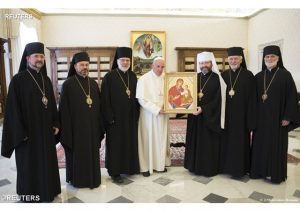 One of the resolutions of the 2016 Synod of Bishops of Ukrainian Greek Catholic Church (UGCC) which met September 4-11, 2016, in Lviv-Brukhovychi, is the following:
One of the resolutions of the 2016 Synod of Bishops of Ukrainian Greek Catholic Church (UGCC) which met September 4-11, 2016, in Lviv-Brukhovychi, is the following:
In order to evoke an interest to the social ministering among faithful of UGCC and behave a virtue of sacrifice and mercy, to announce in UGCC:
- Sunday of a Prodigal Son – Day of the extreme care for prisoners; Sunday of Meatfare – Day of Social service and charity;
- Restoring a tradition of Social days initiated by righteous Metropolitan Andrey Sheptytsky;
- To organize days between Sundays, mentioned as previous points as Social days and be involved in intellectual and charitable activities at the parishes.
His Beatitude, Patriarch Sviatoslav is encouraging us to look at the ways we can implement these items in our life of faith on a personal level and in our parish. It is the hope that our Parish will extend the range of Social ministry and quality, and introduce its institutional development and commitment to those in need. This is the teaching of Jesus Christ, the Fathers of the Church, and the teachers and bishops of the Church. These recommendations are consistent with the Year of Mercy which Pope Francis has called us to live.
On Catholic and Orthodox relations
Our own parishioner, John Burger, has written an article, “Catholic and Orthodox find common ground.” It is published online with Aleteia.org
20th Sunday after Pentecost
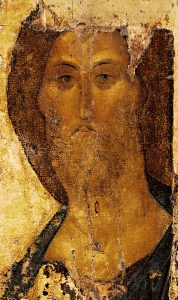 Meditation by the Very Rev. Dr. David M. Petras
Meditation by the Very Rev. Dr. David M. Petras
Galatians 1:11-19; Luke 6:31-36
In the Gospel of St. Matthew, Jesus commands us, “Be perfect, just as your heavenly Father is perfect. (Matthew 5:47)” In Luke’s Gospel, he commands, “Be merciful, just as your Father is merciful. (Luke 6:36)” Mercy, therefore, is perfection. How, indeed, can we, weak and finite human beings achieve “perfection.” How can we keep God’s command. St. Gregory of Nyssa pondered that problem and asked that question. His response was, that perhaps perfection consists in this: constant growth in the good. It might seem that God is asking the impossible of us today, “love your enemies and do good to them, and lend expecting nothing back.” This goes against every human instinct, yet this is what God demands, for this is how God is merciful. That God is merciful appears on every page of the Scripture, and we pray constantly, “Lord, have mercy.” We cannot ask God’s mercy unless we are merciful. Perhaps the answer to this problem is the same as perfection: we must constantly grow in mercy. If we do not, then we grow in hate. If we seek revenge and retribution, then pain and hate simply grow and grow in a circle of mutual destruction. God’s command is ultimately the only logic of a God who has created all things and loves all. Today we must do the impossible, today we must become a Christian, through God’s help.
Protection of the Theotokos
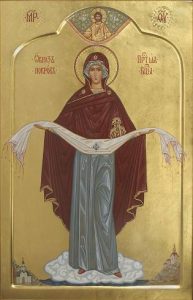 Meditation by Very Rev. Dr. David Petras
Meditation by Very Rev. Dr. David Petras
There is only one God, one Creator, one Savior, one Redeemer. Yet this one God has chosen to be friends with his creation. As St. Paul told us, he humbled himself to become a man, like us in every way except sin. There are many ways he could have become a man, but he chose to be born of a woman who in her human nature, accepted completely the will of God, so that through her God could enter into our time and our story. Then, at Cana, it was his mother, a woman, who by her plea, guided God to make wine out of water, telling the stewards, and through them, saying to all of us, “Do whatever he tells you.” Today we rejoice and celebrate in this human being, who through her will, God intervened in human life to bring us salvation. This is why we can celebrate her protection, why we can sing, “Through the prayers of the Theotokos, O Savior, save us,” and why we can even pray, “Most Holy Theotokos, save us!” Glory to God, who has made us partakers in the divine nature. (2 Peter 1:4)”
Divine Liturgy at the parish today, October 1, at 8:00 a.m.
Byzantine Catholic theology explored
If you have ever been interested in the deeper questions of theology from the Byzantine perspective, or have had doubts about the teachings of the Church, perhaps a little study will help you clarify what the Byzantine Catholic Church holds and teaches and how she forms the hearts and minds of the faithful.
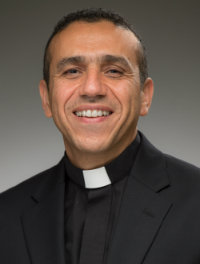 Father Khaled Anatolios, PhD of the University of Notre Dame’s Department of Theology is a married priest of the Melkite Eparchy of Newton. He explains his current work as a professor, researcher and writer in this brief video.
Father Khaled Anatolios, PhD of the University of Notre Dame’s Department of Theology is a married priest of the Melkite Eparchy of Newton. He explains his current work as a professor, researcher and writer in this brief video.
Father Anatolios is interested in all aspects of the theology of the early Church, with special emphasis on the Trinitarian and Christological doctrines of the Greek fathers and Augustine; early Christian biblical exegesis; and the engagement between early Christian theological reflection and contemporary theologians. His current research focuses on the doctrine of salvation, particularly the disconnect between classical sources and modern experience. “Christian teaching comes out of a history of interpretation, of conversation, of dialogue, of debate, sometimes of conflict,” Anatolios said. “To understand the contents of that revelation, we have to try to reinsert ourselves into that culture so that we can re-inhabit that world.”
You may be interested in listening to this talk of Father Anatolios on mystery and the Holy Trinity.